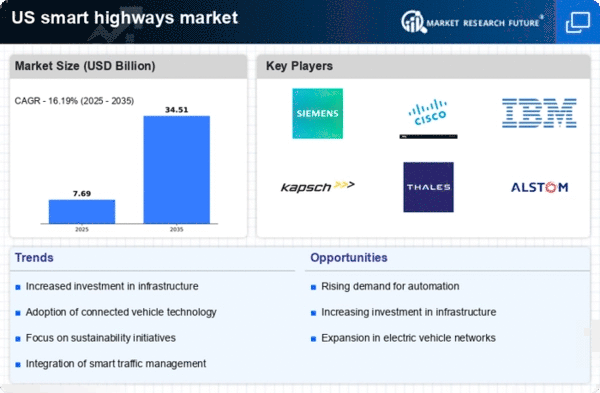Rising Traffic Congestion
The escalating issue of traffic congestion in urban areas is a significant driver for the smart highways market. With the population in metropolitan regions increasing, the demand for efficient traffic management solutions has never been higher. Smart highways utilize real-time data analytics and adaptive traffic signals to alleviate congestion, thereby improving travel times and reducing emissions. According to the Texas A&M Transportation Institute, congestion costs the US economy over $166 billion annually. This alarming statistic underscores the urgent need for smart highway solutions, which are expected to capture a larger market share as cities seek to implement effective traffic management systems.
Increased Focus on Road Safety
The growing emphasis on road safety is a critical driver for the smart highways market. With traffic accidents resulting in thousands of fatalities each year, there is a pressing need for innovative solutions to enhance safety on the roads. Smart highways incorporate advanced technologies such as automated warning systems, real-time monitoring, and predictive analytics to mitigate risks. According to the National Highway Traffic Safety Administration, implementing smart technologies could reduce traffic fatalities by up to 30%. This potential for improved safety outcomes is likely to drive investments in smart highway infrastructure, further propelling market growth.
Government Initiatives and Funding
The smart highways market is experiencing a surge in growth due to various government initiatives aimed at enhancing transportation infrastructure. Federal and state governments are increasingly allocating funds to develop smart highway systems, which integrate advanced technologies for traffic management and safety. For instance, the Infrastructure Investment and Jobs Act has earmarked billions of dollars for transportation projects, including smart highways. This funding is expected to stimulate innovation and attract private investments, thereby accelerating the adoption of smart technologies. As a result, the smart highways market is projected to grow at a CAGR of approximately 15% over the next five years, driven by these government efforts.
Advancements in Communication Technologies
The rapid advancements in communication technologies, particularly 5G, are poised to revolutionize the smart highways market. Enhanced connectivity allows for seamless communication between vehicles and infrastructure, facilitating the implementation of intelligent transportation systems. This technological evolution enables features such as vehicle-to-everything (V2X) communication, which enhances safety and efficiency on the roads. As 5G networks become more widespread, the smart highways market is likely to expand significantly, with estimates suggesting a potential market value increase of over $30 billion by 2030. The integration of these technologies is crucial for the future of transportation.
Environmental Regulations and Sustainability Goals
The smart highways market is also being propelled by stringent environmental regulations and sustainability goals set by federal and state authorities. As the US aims to reduce greenhouse gas emissions, there is a growing push for eco-friendly transportation solutions. Smart highways facilitate the integration of electric vehicle charging stations and promote efficient traffic flow, which can significantly lower emissions. The Environmental Protection Agency has indicated that transportation accounts for nearly 29% of total greenhouse gas emissions in the US. Consequently, the adoption of smart highway technologies is expected to align with sustainability initiatives, driving market growth as stakeholders seek to comply with these regulations.

















